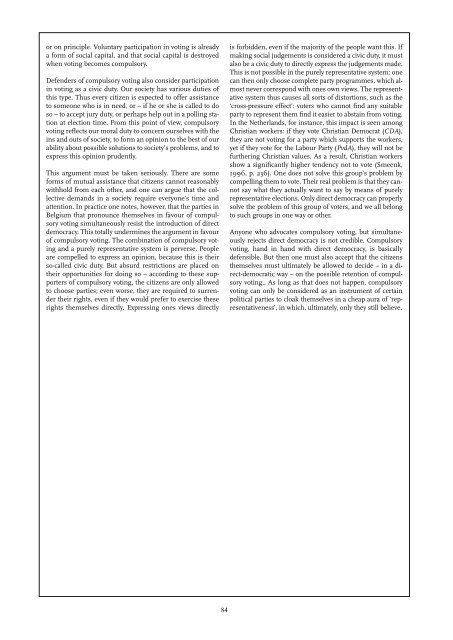Facts and Arguments about the Introduction of Initiative and ...
Facts and Arguments about the Introduction of Initiative and ...
Facts and Arguments about the Introduction of Initiative and ...
Create successful ePaper yourself
Turn your PDF publications into a flip-book with our unique Google optimized e-Paper software.
or on principle. Voluntary participation in voting is already<br />
a form <strong>of</strong> social capital, <strong>and</strong> that social capital is destroyed<br />
when voting becomes compulsory.<br />
Defenders <strong>of</strong> compulsory voting also consider participation<br />
in voting as a civic duty. Our society has various duties <strong>of</strong><br />
this type. Thus every citizen is expected to <strong>of</strong>fer assistance<br />
to someone who is in need, or – if he or she is called to do<br />
so – to accept jury duty, or perhaps help out in a polling station<br />
at election time. From this point <strong>of</strong> view, compulsory<br />
voting reflects our moral duty to concern ourselves with <strong>the</strong><br />
ins <strong>and</strong> outs <strong>of</strong> society, to form an opinion to <strong>the</strong> best <strong>of</strong> our<br />
ability <strong>about</strong> possible solutions to society’s problems, <strong>and</strong> to<br />
express this opinion prudently.<br />
This argument must be taken seriously. There are some<br />
forms <strong>of</strong> mutual assistance that citizens cannot reasonably<br />
withhold from each o<strong>the</strong>r, <strong>and</strong> one can argue that <strong>the</strong> collective<br />
dem<strong>and</strong>s in a society require everyone’s time <strong>and</strong><br />
attention. In practice one notes, however, that <strong>the</strong> parties in<br />
Belgium that pronounce <strong>the</strong>mselves in favour <strong>of</strong> compulsory<br />
voting simultaneously resist <strong>the</strong> introduction <strong>of</strong> direct<br />
democracy. This totally undermines <strong>the</strong> argument in favour<br />
<strong>of</strong> compulsory voting. The combination <strong>of</strong> compulsory voting<br />
<strong>and</strong> a purely representative system is perverse. People<br />
are compelled to express an opinion, because this is <strong>the</strong>ir<br />
so-called civic duty. But absurd restrictions are placed on<br />
<strong>the</strong>ir opportunities for doing so – according to <strong>the</strong>se supporters<br />
<strong>of</strong> compulsory voting, <strong>the</strong> citizens are only allowed<br />
to choose parties; even worse, <strong>the</strong>y are required to surrender<br />
<strong>the</strong>ir rights, even if <strong>the</strong>y would prefer to exercise <strong>the</strong>se<br />
rights <strong>the</strong>mselves directly. Expressing ones views directly<br />
is forbidden, even if <strong>the</strong> majority <strong>of</strong> <strong>the</strong> people want this. If<br />
making social judgements is considered a civic duty, it must<br />
also be a civic duty to directly express <strong>the</strong> judgements made.<br />
This is not possible in <strong>the</strong> purely representative system: one<br />
can <strong>the</strong>n only choose complete party programmes, which almost<br />
never correspond with ones own views. The representative<br />
system thus causes all sorts <strong>of</strong> distortions, such as <strong>the</strong><br />
‘cross-pressure effect’: voters who cannot find any suitable<br />
party to represent <strong>the</strong>m find it easier to abstain from voting.<br />
In <strong>the</strong> Ne<strong>the</strong>rl<strong>and</strong>s, for instance, this impact is seen among<br />
Christian workers: if <strong>the</strong>y vote Christian Democrat (CDA),<br />
<strong>the</strong>y are not voting for a party which supports <strong>the</strong> workers,<br />
yet if <strong>the</strong>y vote for <strong>the</strong> Labour Party (PvdA), <strong>the</strong>y will not be<br />
fur<strong>the</strong>ring Christian values. As a result, Christian workers<br />
show a significantly higher tendency not to vote (Smeenk,<br />
1996, p. 236). One does not solve this group’s problem by<br />
compelling <strong>the</strong>m to vote. Their real problem is that <strong>the</strong>y cannot<br />
say what <strong>the</strong>y actually want to say by means <strong>of</strong> purely<br />
representative elections. Only direct democracy can properly<br />
solve <strong>the</strong> problem <strong>of</strong> this group <strong>of</strong> voters, <strong>and</strong> we all belong<br />
to such groups in one way or o<strong>the</strong>r.<br />
Anyone who advocates compulsory voting, but simultaneously<br />
rejects direct democracy is not credible. Compulsory<br />
voting, h<strong>and</strong> in h<strong>and</strong> with direct democracy, is basically<br />
defensible. But <strong>the</strong>n one must also accept that <strong>the</strong> citizens<br />
<strong>the</strong>mselves must ultimately be allowed to decide – in a direct-democratic<br />
way – on <strong>the</strong> possible retention <strong>of</strong> compulsory<br />
voting,. As long as that does not happen, compulsory<br />
voting can only be considered as an instrument <strong>of</strong> certain<br />
political parties to cloak <strong>the</strong>mselves in a cheap aura <strong>of</strong> ‘representativeness’,<br />
in which, ultimately, only <strong>the</strong>y still believe.
















